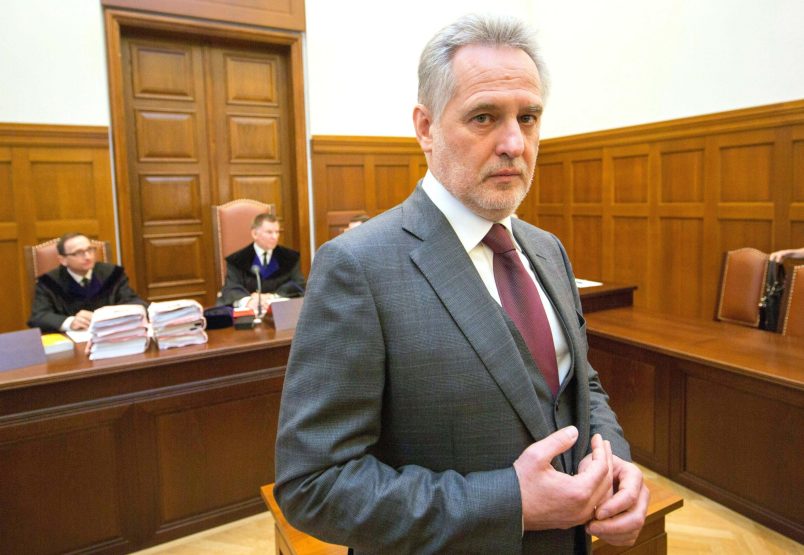Rudy Giuliani had his travel expenses covered by an indicted Ukrainian oligarch’s company as he sought dirt on President Biden, the New York Times reported this week.
It’s a bombshell that requires us to think back, before the election overthrow attempt, before two impeachments, to 2019, when Giuliani was gallivanting around former Soviet states seeking ways to smear Trump’s likely opponent.
The revelation of who was paying his bills would have been shocking — if not entirely surprising — at the time. It remains shocking today. But, if anything, much of the coverage of it is understated.
The point isn’t only that Giuliani’s paymaster is under federal indictment. Rather, it’s who the oligarch — Dmytro Firtash — is.
The Times reported that Firtash’s firm paid thousands of dollars for Giuliani’s travel in summer 2019, including for a stay at the Ritz London and for private flights.
Giuliani and Firtash have issued similar responses to the Times’ report: Giuliani, via an attorney, claims that the former mayor had “no idea” the oligarch was funding the trips. A Firtash representative told the Times that the oligarch was unaware, too, claiming the payments were due to an “inadvertent error” and that Firtash did not authorize the transactions.
The implication of the cash flows, as the New Republic noted, is that a pro-Kremlin oligarch paid for Giuliani’s efforts to dig up dirt on former President Trump’s political opponent at the time: Joe Biden.
A close look at Firtash and allegations around his past connections and dealings sheds more light on who financed Giuliani’s summer 2019 activities.
Gassing out
The big scandal that first put Firtash in the crosshairs of the DOJ had to do with the gas trade between Russia and Europe, via Ukraine.
It’s a topic that’s familiar today, as Moscow throttles gas flows to Europe as part of a pressure campaign to diminish support for Ukraine’s defense.
But in the mid-2000s, it was all about the money and, eventually, the corruption: in 2006, nonprofit Global Witness released a report identifying several intermediary firms in the gas trade between the states with murky ties to political leadership in the countries. The scandal had the potential to be huge, with billions of dollars in profits reportedly being siphoned away from gas flows into Europe via the intermediaries.
Reports identified the beneficial owner of the firms as Dmytro Firtash, a then-unknown businessman. It set off a race among journalists and researchers to answer basic questions about the man — including what he looked like.
Over time, more has come out.
Firtash emerged from the wild ’90s in Western Ukraine, a former firefighter and driver who nearly bled out on the floor of a bar in the former Hapsburg city of Chernivtsi after a 1996 shooting.
By 2001, Firtash resurfaced as an intermediary between Central Asian governments and the Europe gas trade.
Over time, suspicion mounted that Firtash was linked to Semyon Mogilevich, a notorious Russian mobster who remains on the FBI’s Most Wanted List with a $5 million price on his head.
Firtash and his representatives have strongly denied any ties to Mogilevich, but diplomatic cables released by Wikileaks suggest otherwise. Then U.S. Ambassador to Ukraine William Taylor (a name familiar to those who closely followed Trump’s first impeachment) authored a series of cables based on meetings he held with Firtash. In one of them, Firtash purportedly said that he only got into business after receiving approval from Mogilevich.
Federal prosecutors never charged Firtash with anything having to do with the Russia-Ukraine-Europe gas trade, or with Mogilevich, though they have described him as an “upper-echelon” associate of Russian organized crime.
The indictment that came down in April 2014 accused Firtash of arranging the bribery of Indian officials to gain access to mining concessions.
The first impeachment
Since then, Firtash has been stuck in Vienna, undertaking a series of strategies to avoid extradition to Chicago, where a federal grand jury returned the indictment against him.
That effort has focused on fighting the case in Austria, and also attempting to have the charges dropped in the U.S. It’s seen Firtash appoint a former Austrian justice minister to his legal team and, in July 2019, hire two attorneys who informally advised President Trump: Joe DiGenova and Victoria Toensing.
DiGenova and Toensing hired a Giuliani associate at the time — Lev Parnas — as Giuliani sought damaging information about Joe Biden.
Another DiGenova and Toensing client — former AP reporter John Solomon — published an affidavit that the two lawyers obtained from Firtash, rehashing long-debunked allegations against Biden.
DiGenova and Toensing also reportedly scored a face-to-face meeting with Attorney General Bill Barr.
All of this puts the New York Times report in much sharper relief: Giuliani, an attorney for President Trump, was having his expenses covered by a Ukrainian oligarch with alleged but unconfirmed ties to the Russian mafia, as the former New York City mayor sought dirt on President Biden.
Both parties directly involved — Giuliani and Firtash — claim ignorance.
The Times reported that the DOJ is unlikely to issue charges in the matter.







FARA violation? But Guiliani and T**** have no untoward Russian influence, right, boss?
Almost goes w/o saying that Firtash would contact Giuliani regarding something to do with the gas trade.
Wow! Color me shocked and surprised by this news…

And why am I not surprised? At this point the question around the Trump camp is what have the Russians not paid for?
Almost a dog bites man story, except the corruption is so extreme that I guess it is a mammoth sized dog continues to bite man story.
Hope the Fulton County GA DA has a different outcome for Rudy.
"The former NYC mayor says he was unaware … "
Man speaks the truth.